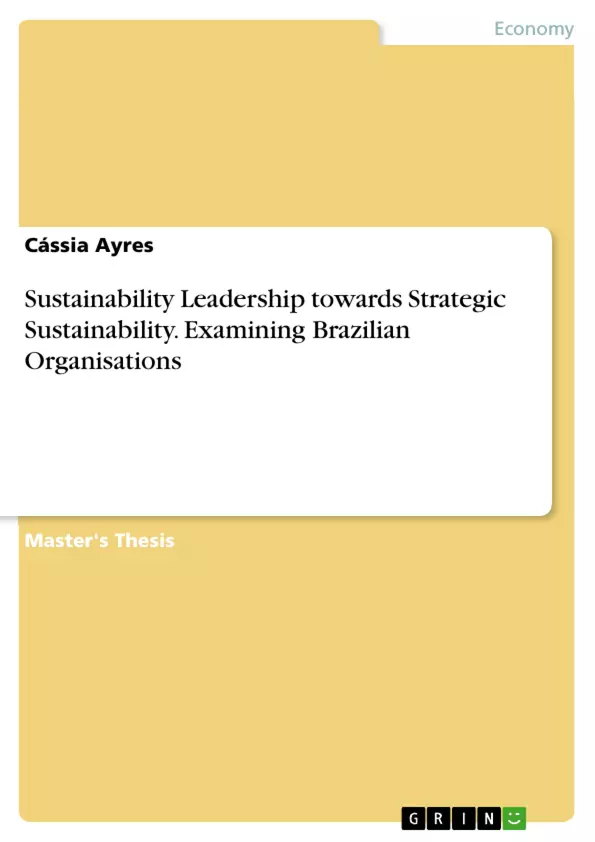This study examines how sustainability leadership drives strategic sustainability by using four large Brazilian organisations as a sample to analyse how this relationship happens, and the implications of it. The results show that there is a positive influence from this leadership towards corporate sustainability strategies when three main factors are in place: (1) Support of top leadership through its projection of vision, motivation and risk-taking in a innovative way; (2) Skilled leaders which are highly knowledgeable about their business and sustainability as well being able to possess emotional competence; (3) Leadership with a system thinking approach, comprising a holistic vision and co-participation of different actors. The main implication of this study is that developing the leadership in the mentioned factors would lead to improvement of these organisations’ sustainability practices, and possibly towards more transformational ones. Therefore, it is suggested that leadership programmes work to develop the elements found in the model proposed systematically. Eventually, this model and these recommendations can be adapted to the realities of other organisations that resonate with the characteristics found in the group.
Inhaltsverzeichnis (Table of Contents)
- Acknowledgment
- Abstract
- CHAPTER 1: This project
- 1.1 Introduction
- 1.2 Aim and objectives
- 1.3 Research Question
- 1.4 Significance and inspiration
- CHAPTER 2: Literature Review
- 2.1 Part A Strategic Sustainability
- 2.1.1 Evolution and motivations
- 2.1.2 Causes of inefficiency
- 2.1.3 Transitional and transformational
- 2.1.4 Sustainability Value Framework
- 2.1.5 SVF through transformational approaches
- 2.1.6 Evaluation of SVF's
- 2.1.7 Corporate sustainability in Brazil
- 2.2.4 Part A summary
- 2.2 Part B Sustainability leadership
- 2.2.1 New ways to lead are required
- 2.2.2 Definition of sustainability leadership
- 2.2.3 Streams of sustainability leadership
- 2.2.3.1 Behaviour orientated leadership
- 2.2.3.2 Technical-instrumental or task oriented
- 2.2.3 Trends in sustainability leadership
- 2.2.4 Part B summary
- 32.2.5 Gaps in the literature
- 2.1 Part A Strategic Sustainability
- CHAPTER 3: Methodology
- 3.1 Chapter introduction
- 3.2 Overview of research methodology
- 3.3 Samples
- 3.4 Data Collection process
- 3.4.1 Interviews
- 3.4.2 Case study method
- 3.5 Data analysis
- 3.6 Chapter summary
- CHAPTER 4: Findings
- 4.1 Chapter introduction
- 4.2 Case studies presentation
- 4.2.1 Duratex SA
- 4.2.2 Votorantim Metals
- 4.2.3 AES Brasil (Eletropaulo)
- 4.2.4 Tetra Pak
- 4.3 Data analysis process
- 4.4 Summary of key findings
- 4.6 Chapter summary
- CHAPTER 5: Discussion
- 5.1 Chapter introduction
- 5.2 Discussion of the drivers and supporting findings
- 5.2.1 Strategic sustainability
- 5.3 Implications of this study
- 5.4 Limitations of this study
- 5.5 Recommendations for further research
- 4.6 Recommendation for the organisations
Zielsetzung und Themenschwerpunkte (Objectives and Key Themes)
This study investigates how sustainability leadership facilitates the development of strategic sustainability in Brazilian organisations. The research aims to understand the drivers and supporting factors in this process, as well as identify the key elements of sustainability leadership in the context of Brazil.
- Strategic Sustainability in Brazilian Organisations
- Sustainability Leadership in Brazil
- Drivers and Supporting Factors
- Case Studies of Sustainability Leadership
- Implications for Future Research
Zusammenfassung der Kapitel (Chapter Summaries)
Chapter 1 introduces the project, outlining its aim and objectives. The research question is presented, highlighting the significance and inspiration for the study. Chapter 2 reviews the existing literature on strategic sustainability and sustainability leadership. It explores the evolution and motivations for adopting strategic sustainability, examining various approaches and frameworks. The chapter also delves into the concept of sustainability leadership, defining it and exploring its different streams and trends. Chapter 3 outlines the research methodology, including the sample selection, data collection process, and data analysis methods. The chapter also discusses the use of case studies and interviews as data collection methods. Chapter 4 presents the findings of the case study analysis, focusing on the practices of four Brazilian organisations: Duratex SA, Votorantim Metals, AES Brasil (Eletropaulo), and Tetra Pak. The chapter also presents a summary of the key findings. Chapter 5 discusses the implications of the study, including the drivers and supporting factors for strategic sustainability and the role of sustainability leadership in this process. It also identifies limitations of the study and recommends further research.
Schlüsselwörter (Keywords)
The key concepts of the research include sustainability leadership, strategic sustainability, Brazilian organisations, case studies, drivers, supporting factors, and frameworks. The research also explores the role of leadership in driving sustainable practices within organisations, drawing insights from real-world case studies.
Frequently Asked Questions
What drives strategic sustainability in Brazilian organizations?
Key drivers include top leadership support, skilled leaders with emotional competence, and a systems thinking approach that involves a holistic vision.
How is "Sustainability Leadership" defined in this study?
It is defined as leadership that projects vision and motivation while taking innovative risks to drive transformational sustainability practices.
Which Brazilian companies were analyzed in the case studies?
The study examined Duratex SA, Votorantim Metals, AES Brasil (Eletropaulo), and Tetra Pak to understand their sustainability strategies.
What is the "Sustainability Value Framework" (SVF)?
It is a framework used to evaluate how organizations create value through sustainable practices, moving from transitional to transformational approaches.
What is a "Systems Thinking" approach in leadership?
It comprises a holistic vision and the co-participation of different actors to solve complex sustainability challenges systematically.
- Quote paper
- Cássia Ayres (Author), 2015, Sustainability Leadership towards Strategic Sustainability. Examining Brazilian Organisations, Munich, GRIN Verlag, https://www.grin.com/document/506000



